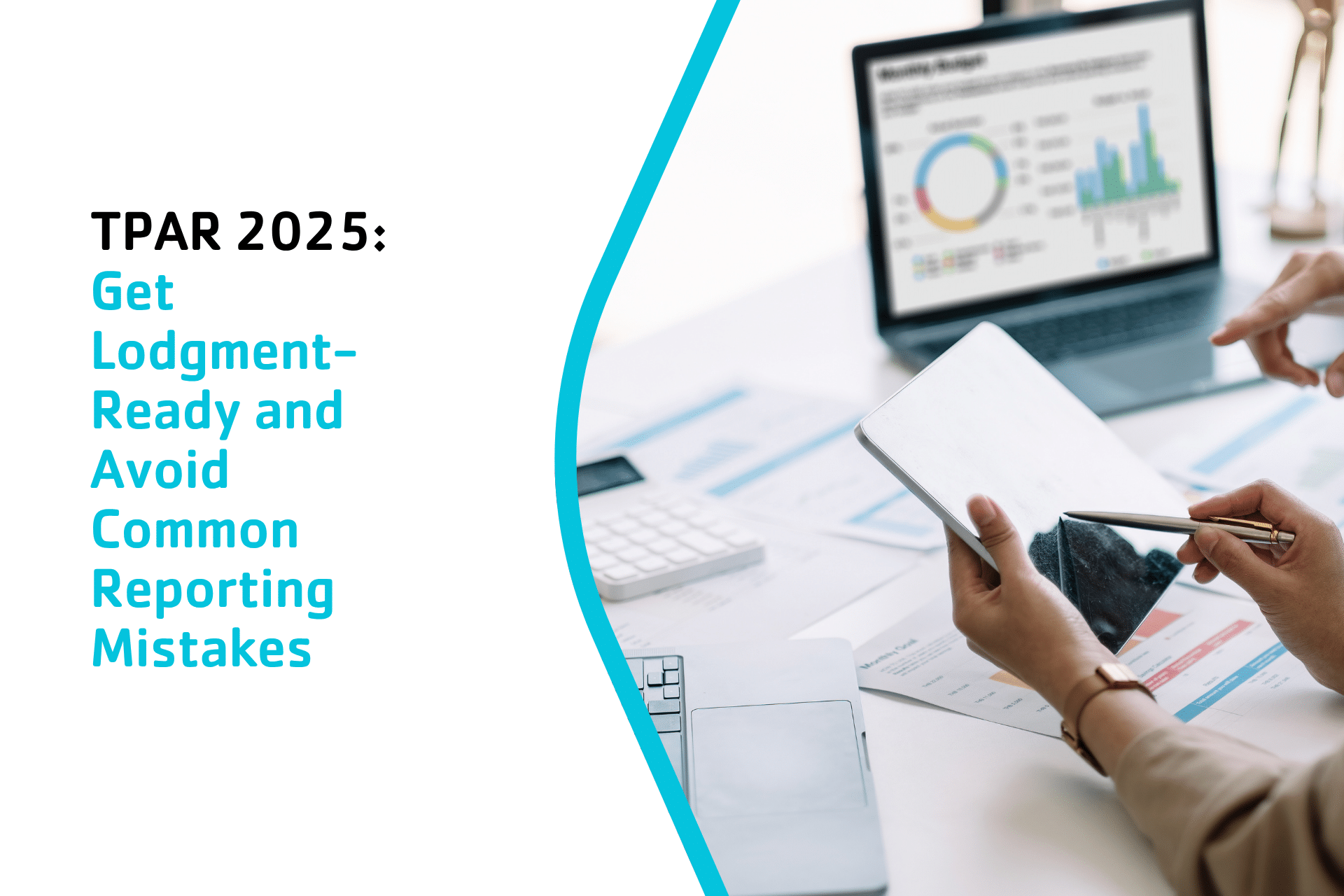As we approach the end of the financial year, it’s important for business owners in certain service-based industries to turn their attention to the Taxable Payments Annual Report (TPAR). If your business engages contractors and earns income through specific services such as building and construction, cleaning, courier, IT, road freight or security services, you may be required to lodge a TPAR with the ATO by 28 August 2025.
While many businesses intend to stay compliant, it’s not uncommon for reporting errors or oversights to occur, particularly if you’re unsure whether you meet the income threshold or you’re unclear on what qualifies as a reportable payment. In this guide, we’ll walk you through the key points to understand TPAR, outline common mistakes to avoid and offer a practical checklist to ensure you’re prepared ahead of the deadline.
Table of Contents
What is TPAR and Why Does it Matter?
The Taxable Payments Annual Report is an annual lodgment requirement for businesses that make payments to contractors for certain services. The report is submitted to the ATO and includes details such as the contractor’s ABN, business name and the total amount paid (including GST). TPAR forms part of the ATO’s broader strategy to ensure tax compliance and transparency across industries where contractor arrangements are common and may otherwise go under-reported.
Lodging your TPAR accurately and on time is essential, not only to avoid penalties but also to demonstrate that your business takes its compliance obligations seriously. As the ATO increases its focus on data matching and reporting accuracy, now is the time to ensure your processes are in order.
Who Needs to Lodge TPAR?
Whether or not you need to lodge a TPAR depends on the type of services your business provides and how much of your income is derived from those services. The income threshold that triggers the requirement varies depending on the industry:
- Building and construction services: Lodgment is required if 50% or more of your business income is from these services.
- All other TPAR-reportable industries (cleaning, courier, IT, road freight, security and investigation services): Lodgment is required if 10% or more of your income comes from these services.
It’s important to note that these thresholds apply to the income earned during the financial year, not just payments made to contractors. If you’re unsure whether your business crosses the threshold, a review of your revenue breakdown and service categories is recommended. This is something our bookkeeping team can assist with to ensure you’re not caught off guard.
What Should Be Included in a TPAR?
The TPAR is used to report payments made to contractors who have provided services to your business. These may be individuals, partnerships, companies or trusts. Reportable payments should include:
- The contractor’s name and ABN
- The total amount paid, including GST
- The total GST paid (if applicable)
However, it’s just as important to understand what should not be included. TPAR is not intended to capture payments to employees, nor is it for materials-only transactions or personal/domestic arrangements. You also shouldn’t report:
- Wages or superannuation contributions
- Labour hire arrangements
- Payments made after 30 June for work performed in a prior year
- Payments within the same consolidated group of companies
- Foreign contractors who are subject to PAYG withholding (though non-residents may still need to be reported in some cases). This is a complex area best reviewed with your BAS or tax agent.
A Practical TPAR Checklist to Get Lodgment-Ready
To help you prepare, our bookkeepers have put together a practical pre-lodgment checklist. Going through these steps now will help avoid last-minute lodgment issues and reduce the risk of errors:
- Identify relevant contractor payments made during the financial year. Exclude wages, super and non-service payments.
- Verify that contractor details are complete and up to date. You’ll need their ABN, registered business name and the total payments made to them (including the GST breakdown if applicable).
- Decide how you will lodge your TPAR. Options include the ATO’s Business Portal, Standard Business Reporting (SBR) enabled software or through your registered BAS/tax agent.
- Plan your timeline early. Although the deadline is 28 August, lodging early gives you breathing room to resolve any issues that may arise in compiling your data.
Common TPAR Mistakes in 2025
1. Misunderstanding Industry Thresholds
A business may assume TPAR doesn’t apply because it only provides reportable services occasionally or as part of broader operations. However, even if you offer these services as part of a mixed business model, you may still be required to lodge if the income thresholds are exceeded. An accurate review of your income sources is critical.
2. Reporting Payments That Don’t Belong
TPAR is designed to report payments for contractor services only. It’s a common mistake to include payments for materials, equipment or other non-labour items. Ensure that only genuine service payments to contractors are included.
3. Incomplete or Incorrect Contractor Info
Incorrect ABNs, misspelled business names or missing GST information can trigger flags in the ATO’s systems and may lead to compliance follow-up. Take the time to cross-check your contractor records against invoices and ABN lookup tools.
4. Forgetting About Foreign Contractors
If you’ve engaged international contractors, they may or may not need to be reported, depending on whether they’re subject to PAYG withholding. This is a technical area and one where advice from your bookkeeper or BAS agent can make a significant difference.
5. Leaving Lodgment to the Last Minute
The ATO has been clear that late lodgment is not taken lightly. In previous years, significant penalties have been issued to businesses that lodged late or submitted incorrect information. Avoiding penalties begins with early preparation and the right support.
How Carbon Can Support Your TPAR Lodgment
We know that compliance tasks like TPAR reporting can feel time-consuming, especially when you’re focused on running your business. That’s why our Bookkeeping & CFO Services team works closely with business owners across a wide range of industries to simplify the process, identify any gaps in reporting and ensure lodgment is completed accurately and on time.
We can help you:
- Determine whether your business is required to lodge a TPAR
- Review and reconcile contractor payments
- Ensure all data is complete, accurate and ATO-compliant
- Lodge on your behalf through the correct platform
- Provide ongoing support for future lodgments and best practice record-keeping
Ready to Lodge Your TPAR With Confidence?
The TPAR deadline of 28 August 2025 may seem a while off but preparing now gives you peace of mind and avoids the stress of last-minute compliance pressure. Whether you need a one-off lodgment or year-round support, we’re here to help.
Book your TPAR health check with Carbon today and let’s make your compliance one less thing to worry about. Contact us now to get started.






















